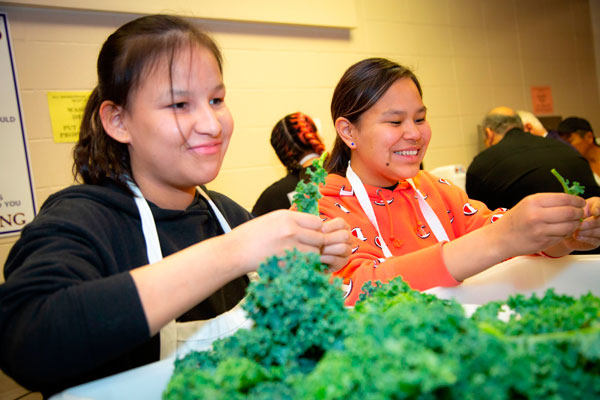
“It’s been rejuvenating, or a burst of energy for me as an educator.”
– Dakota Decaux, Dene High School teacher
A northern Saskatchewan school is feeding their students fresh produce thanks to a grant for a year-round modular farm.
In remote communities like La Loche, it’s more expensive to go to the grocery store and buy fresh produce. Additionally, with the amount of time it takes to ship it there, finding produce fresh enough to eat is a luxury.
This is why President’s Choice Children’s Charity provided the Dene High School there with a $250,000 grant in 2018 for a modular farm. One year later, it’s providing students with new learning opportunities and full stomachs.
A modular farm is an indoor vertical growing system. They can adjust the temperature, amount of water and pH of the water, for example, to grow plants year-round.
Dakota Decaux, the school’s science teacher, is leading the project.
“Given our geographic location and some of our rates of poverty and unemployment and things like that, I think it’s really important for people to have the knowledge base to be able to grow their own food from an economic standpoint, but also the ability to access nutritious food,” she said.
“The biggest impact from the farm has been the opportunity for all of our students to eat healthy produce through our breakfast and lunch program,” which is how their relationship with President’s Choice Children’s Charity began.
They already funded the school’s breakfast and lunch programs, but wanted to do something more to engage the students.
“We really fell in love with La Loche,” said Executive Director Lisa Battistelli.
“Most people don’t realize—We live in a prosperous, big, beautiful country called Canada, but there are children here in our communities that they don’t have access to the basic necessity of healthy food every day.”
The $250,000 covered the farm itself, shipping, a year’s worth of growing supplies and installation costs.
Decaux has also been incorporating it into the high school science curriculum. She teaches her students the requirements for plants to grow and about things like photosynthesis.
It’s revived the school’s horticulture class, which they hadn’t offered for a few years.
“It’s pretty cool to see how excited they are to put a seed into the soil and see it become a plant that we can eventually harvest and eat, so the biggest thing is seeing it from seed to plate,” she said.
“It’s been rejuvenating, or a burst of energy for me as an educator to see how influential hands-on experiential learning can be for students,” she said. “The ability to literally pick a leaf of kale off the wall and eat it is not something that really would have ever been possible where we live without this type of technology.”
Decaux said the school is also wanting to incorporate it into arts classes by painting a mural on the farm’s exterior.
They received the farm in September of 2018. After getting it set up, the school planted their seeds in December, and harvested in January. Since then, they consistently harvested food every week throughout the school year.
Decaux, her colleague and two summer students are currently planting more seeds so produce will be ready to eat when school returns.
“I think it really ignites a passion—a passion for growing; a passion for cooking and eating and then they realize the implications and how important it is to eat fresh vegetables,” added Battistelli.
She said Presidents Choice Children’s Charity is providing grants in British Columbia and Saskatchewan this year—the one in Saskatchewan is for another farm.

